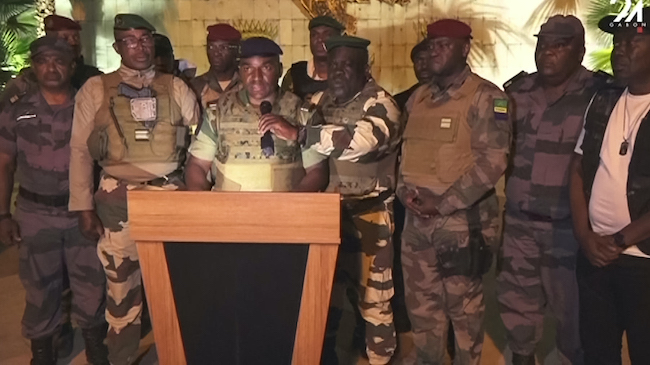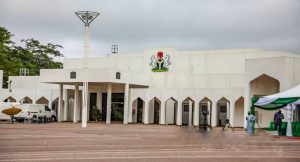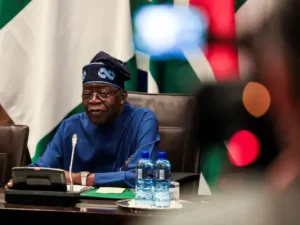
This video grab taken from Gabon 24 shows Gabonese soldiers appearing on television on August 30, 2023 announcing they were "putting an end to the current regime" and the cancellation of an election that, according to official results, President Ali Bongo Ondimba won. - During the announcement, AFP journalists heard gunfire ring out in the Gabonese capital, Libreville. While announcing the cancellation of the results one of the soldiers announced the dissolution of "all the institutions of the republic". "We have decided to defend peace by putting an end to the current regime", one of the soldiers said on TV channel Gabon 24, adding that he was speaking on behalf of the "Committee for the Transition and Restoration of Institutions". "To this end, the general elections of 26 August 2023 and the truncated results are cancelled," he added. "All the institutions of the republic are dissolved: the government, the Senate, the National Assembly and the Constitutional Court," he added, announcing the closure of the country's borders "until further notice". Among the soldiers were members of the Republican Guard as well as soldiers of the regular army and police officers. (Photo by - / Gabon 24 / AFP) / RESTRICTED TO EDITORIAL USE - MANDATORY CREDIT "AFP PHOTO / GABON 24" - NO MARKETING NO ADVERTISING CAMPAIGNS - DISTRIBUTED AS A SERVICE TO CLIENTS - RESTRICTED TO EDITORIAL USE - MANDATORY CREDIT "AFP PHOTO / GABON 24" - NO MARKETING NO ADVERTISING CAMPAIGNS - DISTRIBUTED AS A SERVICE TO CLIENTS /
In light of today’s coup in Gabon and the wave of military takeovers sweeping across West African countries, it is imperative that Africa’s long-standing leaders take heed.
This series of events serves as a resounding wake-up call, underscoring the mounting frustration among citizens who crave change, accountability, and effective governance. The yearning for a more inclusive and democratic society can no longer be disregarded.
The cheering support for the military takeover by Gabonese citizens and massive acceptance by the populace for similar incidents in neighboring countries are indicative of a broader sentiment prevailing among African citizens.
They are demanding a departure from the status quo and are increasingly vocal about their desire for a more transparent and participatory political landscape. The people’s aspirations for a society that values inclusivity, fairness, and the rule of law cannot be ignored any longer.
Africa’s sit-tight leaders must recognize that their citizens’ discontent is not merely a passing phase but a reflection of deep-rooted grievances.
The sweeping gale might soon spread to uproot other sit-tight leaders, especially in West Africa. Cameroon and Equatorial Guinea are two notable examples of countries where leaders have clung to power for extended periods, raising concerns about democratic governance and the peaceful transfer of power.
Cameroon has been ruled by President Paul Biya since 1982, making him one of the longest-serving leaders in Africa. Despite facing numerous challenges, including separatist movements and allegations of human rights abuses, President Biya has managed to maintain his grip on power through a combination of political maneuvering and suppression of dissent.
Equatorial Guinea, under the leadership of President Teodoro Obiang Nguema Mbasogo, has also witnessed a prolonged stay in power. President Obiang has been in office since 1979, following a military coup that ousted his uncle. Despite the country’s vast oil wealth, Equatorial Guinea remains plagued by corruption, poverty, and a lack of political freedoms.
The call for change resonates across the continent, and it is high time for leaders to respond with genuine efforts to address these concerns. This wake-up call should serve as a catalyst for introspection and a reevaluation of governance practices.
To effectively address the growing frustration, leaders must prioritize accountability and good governance. They must embrace transparency, ensuring that the actions of those in power are subject to scrutiny and that corruption is rooted out.
By fostering an environment of trust and openness, leaders can begin to rebuild the fractured relationship between the government and its people.
Furthermore, leaders must actively engage with their citizens, listening to their concerns and involving them in decision-making processes.
A more inclusive approach to governance will not only empower the people but also foster a sense of ownership and collective responsibility. By creating avenues for dialogue and participation, leaders can bridge the gap between themselves and their constituents, forging a stronger and more resilient society.
The wake-up call that Africa’s leaders are currently facing should not be met with resistance or complacency. Instead, it should be embraced as an opportunity for transformation and progress. By heeding the call for change, leaders can pave the way for a brighter future, one that is characterized by accountable leadership, democratic values, and a society that works for the betterment of all its citizens.
In conclusion, the recent events in Gabon and other West African countries serve as a powerful reminder that Africa’s sit-tight leaders must respond to the growing demands for change, accountability, and good governance.
The desire for a more inclusive and democratic society cannot be ignored any longer. It is time for leaders to listen, engage, and take meaningful action to address the concerns of their citizens.
This wake-up call should serve as a turning point, propelling Africa towards a future of progress and prosperity.






